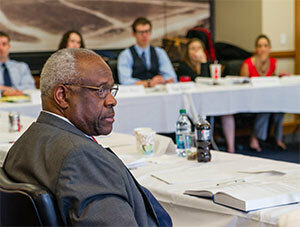Justice Thomas Teaches Seminar on Religious Freedom

Associate Justice Clarence Thomas of the United States Supreme Court visited Notre Dame Law School the week of February 3, 2014, serving as the James J. Clynes Visiting Chair in Judicial Ethics. Over the course of the week, Justice Thomas co-taught with Professor Richard W. Garnett an intensive seminar on “Religious Freedom and the Establishment Clause.”
Justice Thomas, Professor Garnett, and 24 NDLS students spent the week closely examining the Establishment Clause’s text and context, as well as a wide range of commentary and Court decisions dealing with church-state matters and religious freedom. In addition, three outstanding First Amendment scholars – Professor Vincent Munoz, of Notre Dame’s Political Science Department, Professor Philip Hamburger from Columbia Law School, and Dr. Donald Drakeman, author of Church, State, and Original Intent (Cambridge University Press 2010) – contributed to the seminar. The Law School’s Program on Church, State, and Society, which Professor Garnett directs, co-sponsored these scholars’ visits.
Dean Nell Jessup Newton noted that, “During the Justice’s previous visit to Notre Dame, he expressed an interest in returning to campus for this particular course. We were honored and delighted by his interest, and the seminar was an incredible opportunity and experience for the students.”
One of the students in the course, Sarah Quinn, remarked that “the opportunity to engage in deep discussion about religious freedom with Justice Clarence Thomas, along with Professor Garnett and other Establishment Clause scholars, is exactly the type of experience that makes Notre Dame a truly special place to be a student. Justice Thomas challenged us to rethink Establishment Clause precedent, welcomed differing perspectives and criticisms, and helped each of us develop a much deeper understanding of the interaction between church and state.”
In addition to teaching the course, Justice Thomas met with dozens of students and was a guest-lecturer in a first-year Constitutional Law course, as well as the upper-level Constitutional Criminal Procedure class.
"Justice Thomas’s dedication to students and his obvious concern for them was striking and inspiring. His conversations with them and remarks to them are more about finding balance and happiness in life, and about integrating one’s ideals, work, and faith, than about legal cases or political debates," said Garnett.